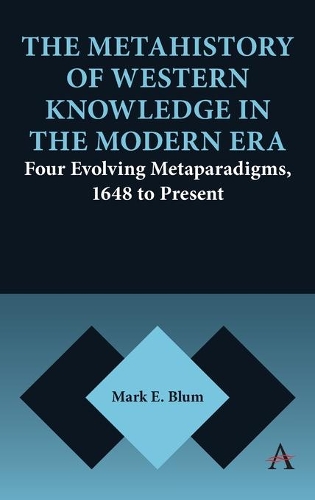
The Metahistory of Western Knowledge in the Modern Era: Four Evolving Metaparadigms, 1648 to Present
(Hardback)
Available Formats
Publishing Details
The Metahistory of Western Knowledge in the Modern Era: Four Evolving Metaparadigms, 1648 to Present
By (Author) Mark E. Blum
Anthem Press
Anthem Press
4th February 2021
United Kingdom
Classifications
Professional and Scholarly
Non Fiction
Fiction: literary and general non-genre
Science: general issues
121.6
Physical Properties
Hardback
270
Width 153mm, Height 229mm, Spine 26mm
454g
Description
The book is a study of the evolving history of knowledge in the arts and sciences in the modern era from 1648 through the present. Modernism is treated as an epoch with evolving disciplines whose articulated problems of a time and the inquiry methods to address them, develop in a coordinated manner, given a mutual awareness.
When one organizes the development of knowledge over periods of years, and gives it an appellation such as Modernism, the organization of facts is guided by concepts and values discerned throughout these periods. These facts of knowledge development share sufficient understandings to be called an era, or an epoch, or other terms that insist on the shared aspects of those years. One can call such an effort a metahistory, in that what is tracked is not merely a knowledge that is political, economic, ideological, sociological, or scientific, but an overview that tracks the respective conceptual developments of the fields in how they have changed and augmented their problem formulations, inquiry methods, and explanatory conceptions over time.
Reviews
Blums vision is as panoramic as the title suggests, moving freely among fields usually kept separate from Pufendorff to Elfriede Jelinek. The work will stimulate discussion and controversy, as ambitious projects always do. It will interest anyone who values the European tradition of grand meta-historical thinking. Whatever ones verdict on Blum's metaparadigms, it is heartening to see the revival of a genre that had once seemed defunct. Hans Kellner, Professor of English, Chair of the NCSU Faculty, North Carolina State University, USA
Author Bio
Mark E. Blum is a professor of European history at the University of Louisville. He has a masters degree in English history from the University of Pennsylvania, and a PhD in Austrian-German history from the University of Pennsylvania. He has published over nine books, several focusing upon the epistemology of human consciousness in its verbal as well as figural foundations.
